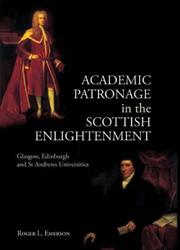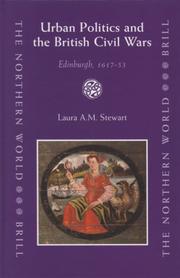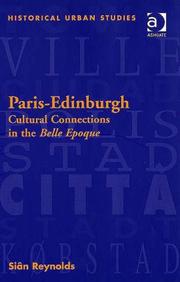| Listing 1 - 7 of 7 |
Sort by
|
Book
ISBN: 1474416616 1474459889 1474416594 9781474416627 1474416624 9781474416610 9781474416597 9781474416603 Year: 2019 Publisher: Edinburgh : Edinburgh University Press,
Abstract | Keywords | Export | Availability | Bookmark
 Loading...
Loading...Choose an application
- Reference Manager
- EndNote
- RefWorks (Direct export to RefWorks)
This is a study of Enlightenment in Edinburgh like no other. Using data and models provided by urban studies theory, it pinpoints the distinctive features that made Enlightenment in the Scottish capital possible.
Enlightenment --- Edinburgh (Scotland) --- History --- Intellectual life --- Aufklärung --- Eighteenth century --- Philosophy, Modern --- Rationalism --- Edinburgh (Lothian) --- City and Royal Burgh of Edinburgh (Scotland) --- Dun Eideann (Scotland) --- Duneideann (Scotland)

ISBN: 0748625968 9780748625963 0748631291 0748653651 1281357618 9786611357610 Year: 2008 Publisher: Edinburgh : Edinburgh University Press,
Abstract | Keywords | Export | Availability | Bookmark
 Loading...
Loading...Choose an application
- Reference Manager
- EndNote
- RefWorks (Direct export to RefWorks)
This book considers the politics of patronage appointments at the universities in Glasgow, Edinburgh and St Andrews. Emerson explores the ways in which 388 men secured posts in three Scottish universities between 1690 and 1806; from the purge following the Revolution of 1688 to the end of Henry Dundas's political career. Most professors were political appointees vetted and supported by political factions and their leaders.
College teachers --- Patronage, Political --- Enlightenment --- Professeurs (Enseignement supérieur) --- Favoritisme --- Siècle des Lumières --- Selection and appointment --- Sélection et nomination --- University of Glasgow --- University of Edinburgh --- University of St. Andrews --- Faculty --- History --- Academicians --- Academics (Persons) --- College instructors --- College lecturers --- College professors --- College science teachers --- Lectors (Higher education) --- Lecturers, College --- Lecturers, University --- Professors --- Universities and colleges --- University academics --- University instructors --- University lecturers --- University professors --- University teachers --- Teachers --- Political patronage --- Spoils system --- Civil service reform --- St. Andrews, Scot. --- St. Andrews University (St. Andrews, Scotland) --- Universitas Andreana --- University of Saint Andrews --- Oilthigh (Glasgow, Scotland) --- Universidad de Glasgow --- Glasgow University --- Oilthigh Ghlaschu --- Université de Glasgow --- Edinburgh University --- Université d'Edimbourg --- Oilthigh Dhùn Èideann --- Academia Jacobi Sexti (Edinburgh, Lothian) --- Edinburgh (Lothian). --- Universidad de Edimburgo --- Universidad de St Andrews --- Universitas Academica Edinburgensis --- Universität Edinburgh --- Università di Edimburgo --- Universiteit van Edinburgh --- Universidade de Edimburgo --- Uniwersytet Edynburski --- Sveučilište u Edinburghu --- Edinburghs universitet --- Universitat d'Edimburg --- Prifysgol Caeredin --- Universitatea din Edinburgh --- Edinburghin yliopisto --- Edinburská univerzita --- Edinburgh (Lothian). Academia Jacobi Sexti --- Edinburgh (Lothian). University of Edinburgh --- Clientelism, Political --- Patron-client politics --- Political clientelism --- Political sociology

ISBN: 0748653651 1281357618 9786611357610 0748631291 9780748631292 9781281357618 9780748625963 0748625968 Year: 2022 Publisher: Edinburgh
Abstract | Keywords | Export | Availability | Bookmark
 Loading...
Loading...Choose an application
- Reference Manager
- EndNote
- RefWorks (Direct export to RefWorks)
This book considers the politics of patronage appointments at the universities in Glasgow, Edinburgh and St Andrews. Emerson explores the ways in which 388 men secured posts in three Scottish universities between 1690 and 1806; from the purge following the Revolution of 1688 to the end of Henry Dundas's political career. Most professors were political appointees vetted and supported by political factions and their leaders.
College teachers --- Enlightenment --- Patronage, Political --- Political patronage --- Spoils system --- Civil service reform --- Academicians --- Academics (Persons) --- College instructors --- College lecturers --- College professors --- College science teachers --- Lectors (Higher education) --- Lecturers, College --- Lecturers, University --- Professors --- Universities and colleges --- University academics --- University instructors --- University lecturers --- University professors --- University teachers --- Teachers --- History --- Faculty --- University of Glasgow --- University of Edinburgh --- University of St. Andrews --- St. Andrews, Scot. --- St. Andrews University (St. Andrews, Scotland) --- Universitas Andreana --- University of Saint Andrews --- Universidad de St Andrews --- Edinburgh University --- Université d'Edimbourg --- Oilthigh Dhùn Èideann --- Academia Jacobi Sexti (Edinburgh, Lothian) --- Edinburgh (Lothian). --- Universidad de Edimburgo --- Universitas Academica Edinburgensis --- Universität Edinburgh --- Università di Edimburgo --- Universiteit van Edinburgh --- Universidade de Edimburgo --- Uniwersytet Edynburski --- Sveučilište u Edinburghu --- Edinburghs universitet --- Universitat d'Edimburg --- Prifysgol Caeredin --- Universitatea din Edinburgh --- Edinburghin yliopisto --- Edinburská univerzita --- Oilthigh (Glasgow, Scotland) --- Universidad de Glasgow --- Glasgow University --- Oilthigh Ghlaschu --- Université de Glasgow --- Edinburgh (Lothian). Academia Jacobi Sexti --- Edinburgh (Lothian). University of Edinburgh --- Clientelism, Political --- Patron-client politics --- Political clientelism --- Political sociology

ISBN: 1281399388 9786611399382 9047409760 9789047409762 9781281399380 9004151672 9789004151673 9789047409762 6611399380 Year: 2006 Publisher: Leiden ; Boston : Brill,
Abstract | Keywords | Export | Availability | Bookmark
 Loading...
Loading...Choose an application
- Reference Manager
- EndNote
- RefWorks (Direct export to RefWorks)
On 23 July 1637, riots broke out in Edinburgh. These disturbances triggered the collapse of royal authority across the British Isles. This volume explores the political and religious culture in the Scottish capital from the reign of James VI and I to the Cromwellian occupation. It examines for the first time the importance of Edinburgh to the formation of the Scottish opposition movement and to the establishment of the revolutionary Covenanting regime. Although the primary focus is the Scottish capital, an explicitly British perspective is maintained. This is a wide-ranging study that engages in debates about early modern urban culture, the problem of multiple monarchy and the issue of post-Reformation religious radicalism.
Edinburgh (Scotland) --- Great Britain --- Scotland --- Edinburgh (Lothian) --- City and Royal Burgh of Edinburgh (Scotland) --- Dun Eideann (Scotland) --- Duneideann (Scotland) --- History --- Intellectual life --- Politics and government --- 17th century --- James VI, 1567-1625 --- Charles I, 1625-1649 --- Civil War, 1642-1649 --- Intellectual life. --- Politics and government. --- Cultural life --- Culture
Book
ISBN: 0190252855 1283427974 9786613427977 0199910316 0199766827 9780199910311 9780190252854 9780199766826 0190208597 Year: 2012 Publisher: Oxford ; New York : Oxford University Press,
Abstract | Keywords | Export | Availability | Bookmark
 Loading...
Loading...Choose an application
- Reference Manager
- EndNote
- RefWorks (Direct export to RefWorks)
A series of bizarre disappearances filled the citizens of early nineteenth-century Scotland with terror. When the perpetrators were finally apprehended in 1828, their motive roiled the nation: William Burke and William Hare had murdered for profit. The cadavers supplied a ready payout, courtesy of Dr. Robert Knox, who was desperate for anatomical subjects. Nearly two hundred years later, these scandalous murders continue to fire imagination in Scotland and beyond. From the start, the sensational events provoked artists and writers. While Sir Walter Scott resisted public comment, his correspond
Literature and history --- Crime in popular culture --- English literature --- Murder in mass media --- National characteristics, Scottish, in literature. --- Scottish authors --- History and criticism. --- Burke, William, --- Hare, William, --- Knox, Robert, --- In mass media. --- History and literature --- History and poetry --- Poetry and history --- Knox, R. --- Knox, --- Burke, Willm. --- Mass media --- Popular culture --- History --- Edinburgh (Scotland) --- Edinburgh (Lothian) --- City and Royal Burgh of Edinburgh (Scotland) --- Dun Eideann (Scotland) --- Duneideann (Scotland)

ISBN: 0691043833 9780691043838 1400884306 9781400884308 9780691121604 0691121605 0691144265 Year: 2016 Volume: *7 Publisher: Princeton, NJ : Princeton University Press,
Abstract | Keywords | Export | Availability | Bookmark
 Loading...
Loading...Choose an application
- Reference Manager
- EndNote
- RefWorks (Direct export to RefWorks)
Scott's Shadow is the first comprehensive account of the flowering of Scottish fiction between 1802 and 1832, when post-Enlightenment Edinburgh rivaled London as a center for literary and cultural innovation. Ian Duncan shows how Walter Scott became the central figure in these developments, and how he helped redefine the novel as the principal modern genre for the representation of national historical life. Duncan traces the rise of a cultural nationalist ideology and the ascendancy of Scott's Waverley novels in the years after Waterloo. He argues that the key to Scott's achievement and its unprecedented impact was the actualization of a realist aesthetic of fiction, one that offered a socializing model of the imagination as first theorized by Scottish philosopher and historian David Hume. This aesthetic, Duncan contends, provides a powerful novelistic alternative to the Kantian-Coleridgean account of the imagination that has been taken as normative for British Romanticism since the early twentieth century. Duncan goes on to examine in detail how other Scottish writers inspired by Scott's innovations--James Hogg and John Galt in particular--produced in their own novels and tales rival accounts of regional, national, and imperial history. Scott's Shadow illuminates a major but neglected episode of British Romanticism as well as a pivotal moment in the history and development of the novel.
English fiction --- Modernism (Literature) --- National characteristics, Scottish, in literature. --- Nationalism in literature. --- Romanticism --- History and criticism. --- Scottish authors --- Scott, Walter, --- 820 --- 820 Engelse literatuur --- Engelse literatuur --- Crepuscolarismo --- Pseudo-romanticism --- Romanticism in literature --- Author of "Waverley," "Ivanhoe," &c., --- Cleishbotham, Jedediah, --- Layman, --- Malagrowther, Malachi, --- Paul, --- S., W. --- Scott, W. --- Skott, Valʹter, --- Skott, Walter, --- Somnambulus, --- Ssu-ko-tʻe, --- Ssu-ko-tʻe, Wa-erh-tʻe, --- Sukotsu, --- Sukotto, --- Templeton, Laurence, --- W. S. --- Wa-erh-tʻe Ssu-ko-tʻe, --- "Waverley," "Ivanhoe," &c., Author of, --- סקאט, וואלטער, --- סקוט, וולטר, --- Influence. --- Scotland --- Edinburgh (Scotland) --- In literature. --- Intellectual life --- Edinburgh (Lothian) --- City and Royal Burgh of Edinburgh (Scotland) --- Dun Eideann (Scotland) --- Duneideann (Scotland) --- Literary movements --- Postmodernism (Literature) --- Aesthetics --- Fiction --- National characteristics, Scottish, in literature --- Nationalism in literature --- English literature --- Scottish authors&delete& --- History and criticism --- 820 English literature. Literature in English --- English literature. Literature in English

ISBN: 1317084063 1281241024 9786611241025 0754683028 9780754683025 9781317084068 9781281241023 6611241027 9780754634645 0754634647 9781315599427 9781317084051 9781138264304 1315599422 1317084071 9781317084075 Year: 2007 Publisher: Aldershot, Hants, England : Ashgate,
Abstract | Keywords | Export | Availability | Bookmark
 Loading...
Loading...Choose an application
- Reference Manager
- EndNote
- RefWorks (Direct export to RefWorks)
By the end of the nineteenth century Paris was widely acknowledged as the cultural capital of the world; Edinburgh by contrast may still be thought of as a rather staid city of lawyers and Presbyterian ministers, academics and doctors. Yet despite this apparent cultural opposition, Professor Reynolds argues that in fact both cities shared a number of similar concerns and ideals that were fostered and developed by growing links and international travel. This book seeks not to treat Paris-Edinburgh links in isolation, or to exaggerate them, but to use them to provide a fresh perspective on the
Scots --- Scotch --- Scottish people --- British --- Ethnology --- Paris (France) --- Edinburgh (Scotland) --- France --- Scotland --- Caledonia --- Scotia --- Schotland --- Sŭkʻotʻŭllandŭ --- Ecosse --- Škotska --- Great Britain --- Bro-C'hall --- Fa-kuo --- Fa-lan-hsi --- Faguo --- Falanxi --- Falanxi Gongheguo --- Faransā --- Farānsah --- França --- Francia (Republic) --- Francija --- Francja --- Francland --- Francuska --- Franis --- Franḳraykh --- Frankreich --- Frankrig --- Frankrijk --- Frankrike --- Frankryk --- Fransa --- Fransa Respublikası --- Franse --- Franse Republiek --- Frant︠s︡ --- Frant︠s︡ Uls --- Frant︠s︡ii︠a︡ --- Frantsuzskai︠a︡ Rėspublika --- Frantsyi︠a︡ --- Franza --- French Republic --- Frencisc Cynewīse --- Frenska republika --- Furansu --- Furansu Kyōwakoku --- Gallia --- Gallia (Republic) --- Gallikē Dēmokratia --- Hyãsia --- Parancis --- Peurancih --- Phransiya --- Pransiya --- Pransya --- Prantsusmaa --- Pʻŭrangsŭ --- Ranska --- República Francesa --- Republica Franzesa --- Republika Francuska --- Republiḳah ha-Tsarfatit --- Republikang Pranses --- République française --- Tsarfat --- Tsorfat --- Γαλλική Δημοκρατία --- Γαλλία --- Франц --- Франц Улс --- Французская Рэспубліка --- Францыя --- Франция --- Френска република --- פראנקרייך --- צרפת --- רפובליקה הצרפתית --- فرانسه --- فرنسا --- フランス --- フランス共和国 --- 法国 --- 法蘭西 --- 法蘭西共和國 --- 프랑스 --- France (Provisional government, 1944-1946) --- Edinburgh (Lothian) --- City and Royal Burgh of Edinburgh (Scotland) --- Dun Eideann (Scotland) --- Duneideann (Scotland) --- Intellectual life --- Social life and customs --- Relations
| Listing 1 - 7 of 7 |
Sort by
|

 Search
Search Feedback
Feedback About UniCat
About UniCat  Help
Help News
News